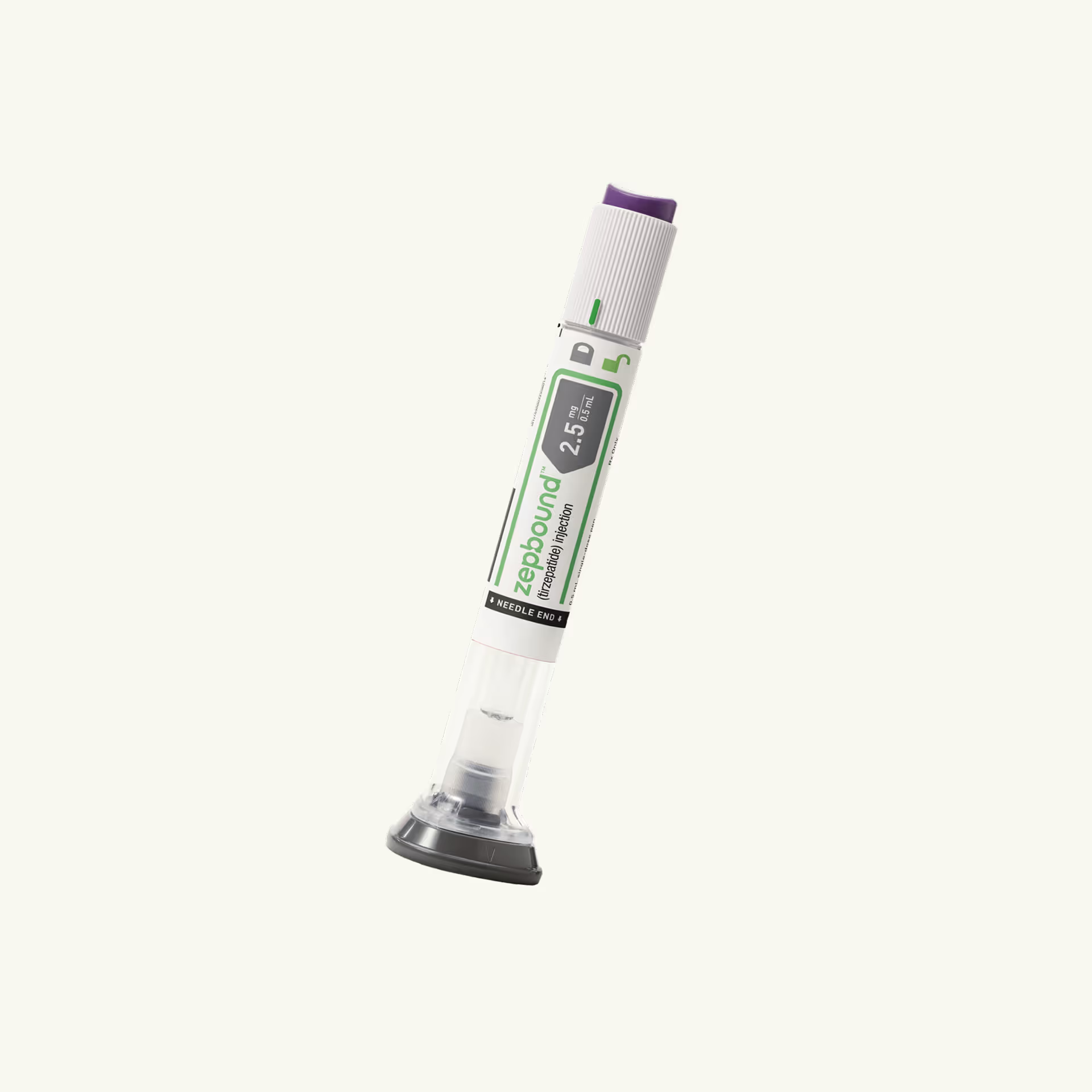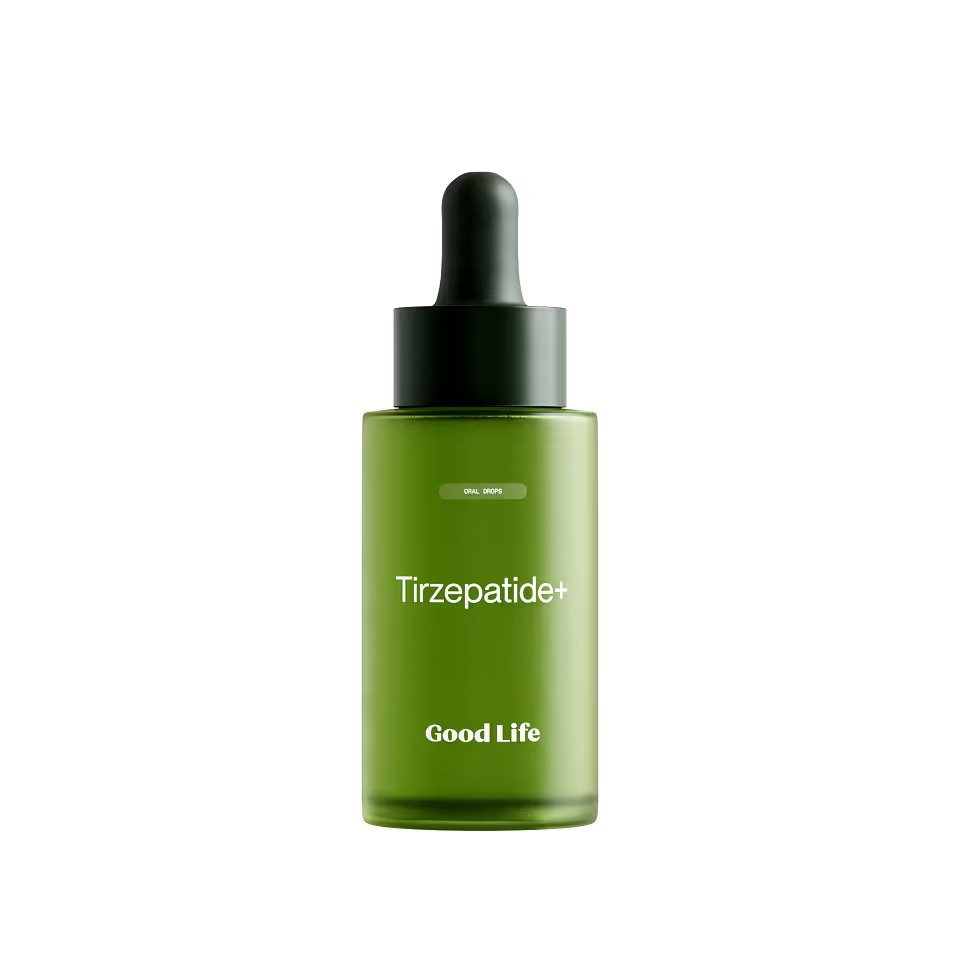Zepbound®
(Tirzepatide) Injection: Zepbound® is a brand-name version of the generic medication tirzepatide. It belongs to a class of medications called GLP-1 receptor agonists.
- Lose 20% of your body weight on average in 1 year.
- New FDA-approved medication for weight loss (same active ingredient as Mounjaro)
- Targets two hormone receptors (GLP-1 and GIP) to maximize weight loss
Free expedited shipping
Lab tested for quality to promote patient safety
No insurance required
Take advantage of our lowest price at checkout
How is Zepbound different from Ozempic® or Wegovy®?
Zepbound and Wegovy are approved by the FDA for weight loss, while Ozempic is approved for the treatment of type 2 diabetes, but can be prescribed off-label for weight loss, if appropriate.
What is Zepbound?
Zepbound is a prescription medication designed for weight loss and long-term weight management. It contains the active ingredient tirzepatide, which mimics the GLP-1 and GIP hormones to help reduce appetite and slow digestion. By making you feel fuller for longer, Zepbound helps you consume fewer calories. It's administered as a once-weekly injection under the skin.
How does Zepbound work?
Zepbound works by mimicking the hormones GLP-1 and GIP, which help regulate appetite and digestion. These hormones make you feel fuller for longer, reducing the urge to eat more frequently and thereby lowering calorie intake. Additionally, Zepbound slows down the speed at which food leaves your stomach, further helping to control appetite. This combination of effects supports weight loss and helps in long-term weight management.



Take Control of Your Appetite, Shed Pounds, Boost Confidence
Discover how Zepbound helps curb cravings and supports healthy, lasting weight loss—so you can boost your confidence and feel energized every day.
Benefits
Reduce appetite and support meaningful, sustained weight loss.

Supports healthy weight loss
Helps reduce appetite and control cravings, making it easier to lose excess weight.

Boosts energy naturally
By enhancing how your body uses nutrients, it can help increase your daily energy levels.

Scientifically proven
Backed by clinical trials demonstrating significant efficacy and results.

Improves blood sugar control
Aids in regulating blood glucose levels, which supports overall metabolic health.

Preserves lean muscle
Encourages fat loss while helping maintain muscle mass for a stronger, healthier body.
Real Stories, Real Results
BMI Calculator
BMI stands for Body Mass Index. It’s a measurement that uses your height and weight to estimate if your weight is in a healthy range for your height.
*BMI doesn’t directly measure body fat and may not accurately reflect health for people with high muscle mass, pregnant women, children, older adults, certain ethnic groups, or those with medical conditions. It shouldn’t be used as the only way to assess health. The BMI calculator does not determine eligibility for weight loss medications. A healthcare provider must evaluate your overall health and history to decide if medication is right for you.
Your BMI






Always quality tested, with proven results



Our medication is conveniently delivered from a state-licensed pharmacy within our network, straight to your door when you need it.
Every batch is fully tested in full chemistry and microbiology labs at the Drug Manufacturer facility to meet strict guidelines and parameters. This provides full confidence in producing industry best results for our consumers through strict compliance with cGMP regulations.
Potency
This test is performed every 3 to 6 months. It confirms that the medication has plus or minus 10% of the appropriate concentration of the active ingredient.
Sterility
This test ensures the medication is free from any contaminants, including bacteria or other pathogens. Every batch is tested and must meet the requirements of USP 797.1.
pH
This test assesses the acid/base balance to ensure minimal irritation upon injection.
Endotoxicity
This test, along with sterility testing, ensures the medication is free of harmful toxins. Every batch is tested for bacterial endotoxins, which may not exceed the threshold limits defined in USP 85.


How it works
Simple Questionnaire
Choose the plan that fits your needs, then complete a free medical intake and health history form for review by a licensed provider.
Provider Evaluation
Our licensed medical provider will review your medical history and determine if the medication is right for you and your needs.
Approved & Delivered
Your prescription gets approved and ships straight to your door in discreet packaging within 3–5 business days.
Good Life Health Guide
Expert insights on health, wellness, and modern care.
Frequently asked questions
Is weight loss more about willpower or diet and exercise?
Effective weight loss isn’t solely about willpower or adjusting your diet and exercise routine. While those factors are important, your body’s biology and genetics also significantly influence weight management. If you’ve faced challenges in losing weight previously, consider exploring additional support through weight loss medications
What are some common mistakes people make when they try to lose weight?
Here are three reasons why weight loss efforts might falter:
- Attempting drastic changes all at once.
- Adopting extreme diets that are difficult to sustain.
- Following generic plans that don’t account for individual biology.
What are the side effects of Zepbound?
The most common side effects of Zepbound are: nausea, diarrhea, vomiting, constipation, stomach pain, indigestion, injection site reactions, feeling tired, allergic reactions, belching/gas, hair loss, and heartburn.
Zepbound may have serious side effects, including possible thyroid tumors. Do not use if you or your family have a history of a type of thyroid cancer called MTC or MEN 2.
Zepbound may cause other serious side effects, including severe gastrointestinal disease, kidney injury, gallbladder disease, inflammation of the pancreas, severe allergic reactions, low blood sugar, complications in patients with diabetic retinopathy, and suicidal thoughts. Zepbound may reduce the efficacy of birth control pills.
See important safety information page for full details.
How are side effects for Zepbound different from Ozempic or Wegovy?
The side effects of Zepbound are similar to Ozempic and Wegovy. However, birth control pills have been shown to be less effective when taking Zepbound. If you’re considering medication with Zepbound, tell your provider about what contraception you’re taking. For more information about side effects see the imporant safety information page.
How much weight can I expect to lose with Zepbound?
In clinical trials, patients lost an average of 20% of their body weight in a year when they combined the highest dose of Zepbound with healthy lifestyle changes.
How do you take Zepbound?
Zepbound is a once-weekly injection that comes in a pre-filled, single-dose pen. If prescribed, you’ll receive detailed instructions from your provider on how to inject it in your stomach, arm, or thigh.
How is Zepbound different from Ozempic® or Wegovy®?
Zepbound and Wegovy are approved by the FDA for weight loss, while Ozempic is approved for the medication of type 2 diabetes, but can be prescribed off-label for weight loss, if appropriate.
The main difference between these medications is the active ingredient. Ozempic and Wegovy use semaglutide, while Zepbound uses tirzepatide. Tirzepatide is a dual-action GLP-1 and GIP, meaning it works by activating two hormone receptors that regulate your metabolism, helping you feel full faster and longer. In comparison, semaglutide only activates the GLP-1 receptor.
How does Zepbound work?
Zepbound mimics two naturally occurring hormones (GLP-1 and GIP) in your body to help you regulate your metabolism. This slows digestion and makes you feel full faster and longer. It also communicates with the part of your brain in charge of hunger to help you regulate how much you eat. On average, patients lost 20% of their body weight in a year using the highest dose of Zepbound when combined with healthy lifestyle changes.
Find answers to common questions about our medication subscriptions and medical review process.


.avif)


.avif)


-min.avif)

